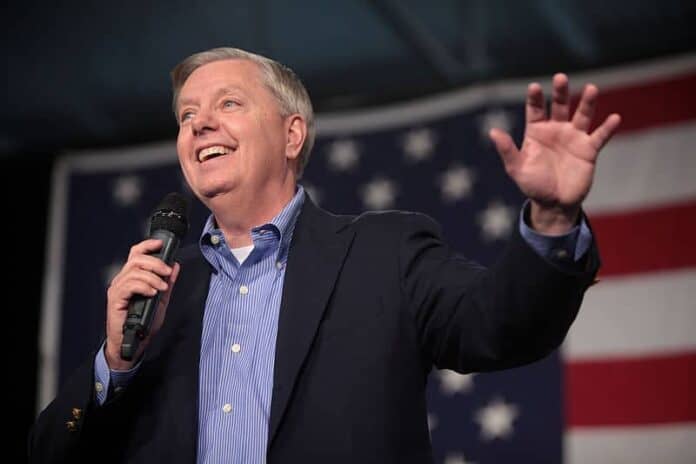(The Center Square) – South Carolina incumbent Republican U.S. Sen. Lindsey Graham is being challenged by Democrat Jaime Harrison and the Constitution Party’s Bill Bledsoe in the November election.
Graham was elected to the U.S. Senate in 2003 and is chairperson of the Senate Judiciary Committee. Before winning the Senate seat, Graham represented South Carolina’s 3rd Congressional District in the U.S. House and served in the South Carolina House.
Harrison, the former chairperson of the South Carolina Democratic Party, is an associate chairperson for the Democratic National Party. He’s a former principal with government relations and public affairs firm Podesta Group.
Bledsoe has run for the U.S. Senate and U.S. House in the past.
Graham and Harrison have agreed to having three debates in October.
The Center Square sent all three candidates an election questionnaire, giving each candidate an opportunity to communicate where they stand on some of the issues the country faces.
None of the candidates responded to these questions posed by The Center Square:
What is your view of the Tax Cuts and Jobs Act of 2017 and what position would you take on it if elected?
Graham: Did not respond to the questionnaire. On his campaign website, Graham says he was a leading advocate in passing the Tax Cuts and Jobs Act. He says it spurred unprecedented economic growth throughout the country, and in South Carolina, it led to record-low unemployment “in the wake of the agenda of deregulation and private enterprise empowerment championed by Senator Graham and President Trump.”
Harrison: Did not respond to the questionnaire. In answering policy questions from the Post and Courier, Harrison says he wants to “right the wrongs” of the Tax Cuts and Jobs Act, such as “closing corporate loopholes and making sure we have a fairer tax code that allows us to expand the middle class.” He says the act will cost the country $2 trillion in the first decade and more than 80 percent of its savings will go to the top 1 percent.
Bledsoe: Did not respond to the questionnaire.
What other tax policies do you support? Would you vote to raise taxes? Explain.
Graham: Did not respond to the questionnaire. On his campaign website, Graham says lower taxes and less regulation are among the “values and priorities” he has fought for in Washington.
Harrison: Did not respond to the questionnaire. On his campaign website, Harrison says he supports tax breaks for middle- and working-class families. He wants to increase the earned income tax credit. He also supports tax credits for child care.
Bledsoe: Did not respond to the questionnaire.
The federal budget deficit and national debt have grown at record paces during the COVID-19 pandemic. How concerned are you about both, and what policies would you support to reduce debt and the recurring budget deficits?
Graham: Did not respond to the questionnaire. In answering policy questions from the Post and Courier, Graham says he long has pushed for bipartisan budget reform. He wants to create a commission to seek ways “to reform entitlements and save Social Security and Medicare from collapse.”
Harrison: Did not respond to the questionnaire. In answering policy questions from the Post and Courier, Harrison says “our nation’s debt has to be a concern for us all. It is not sustainable long term.”
Bledsoe: Did not respond to the questionnaire.
What national health care policies do you support and, if they increase costs, how would you pay for them?
Graham: Did not respond to the questionnaire. In answering policy questions from the Post and Courier, Graham says he does not support the Affordable Care Act and believes the “money and power” should be given to patients and states instead of Washington. He does not support a single-payer system.
Harrison: Did not respond to the questionnaire. In answering policy questions from the Post and Courier, Harrison says he would build on the Affordable Care Act’s successes. He favors expanding Medicaid in South Carolina and says repealing Obamacare “would be a disaster” for the state. He also does not support a single-payer system.
Bledsoe: Did not respond to the questionnaire.
What national energy policies do you support?
Graham: Did not respond to the questionnaire. In answering policy questions from the Post and Courier, Graham says he strongly believes combating greenhouse gases will lead to energy innovations and a cleaner environment. He supports exploring ways to promote wind, solar, nuclear power and emerging technologies. He opposes the Green New Deal and says it would cost South Carolina 67,000 jobs a year.
Harrison: Did not respond to the questionnaire. In answering policy questions from the Post and Courier, Harrison says wants to transition to cleaner energy sources and believes doing so would spur “massive” job growth and make air and water cleaner. He says the Green New Deal is not sound policy because “it’s expensive, not feasible and highly partisan.”
Bledsoe: Did not respond to the questionnaire.
What would be your role as a U.S. Senator in upholding the U.S. Constitution and preserving democracy?
Graham: Did not respond to the questionnaire. On his campaign website, Graham says he’s a strong supporter of the Second Amendment and “has been a steadfast protector of law-abiding gun owners.”
Harrison: Did not respond to the questionnaire. On his campaign website, Harrison says he “will fight to make our democracy fairer, by undoing the damage wrought by the disastrous Citizens United decision and ensuring that politicians do not receive personal profits from public office.”
Bledsoe: Did not respond to the questionnaire.
By Jason Schaumburg | The Center Square
Go to Source
Reposted with permission





![Senator Ron Johnson to Speak at Concordia University [FREE EVENT]](https://www.wisconsinrightnow.com/wp-content/uploads/2024/04/MixCollage-17-Apr-2024-05-34-PM-6196-356x220.jpg)











